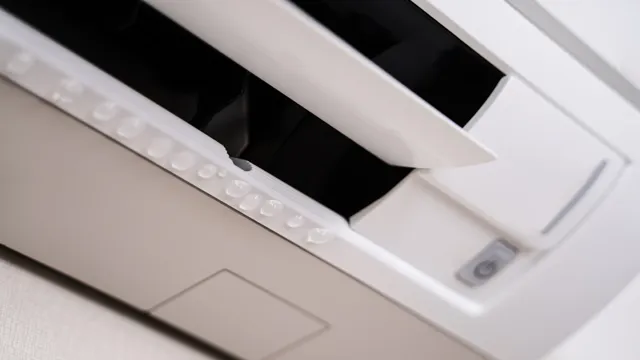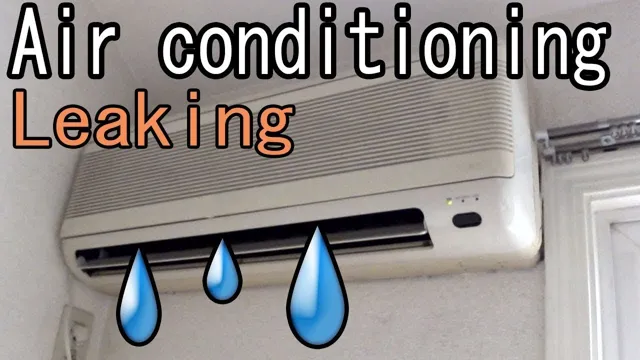Have you noticed water slowly dripping from your AC vent? Don’t ignore it! AC vent leaking is a common problem that can lead to more significant issues if left unaddressed. Several factors can cause your AC vent to leak, and identifying them is crucial to finding a long-term solution. In this blog, we’ll explore some of the reasons why your AC vent might be leaking, and what you can do to fix it.
From blocked drainage lines to improper installation, we’ll cover everything you need to know to prevent further damage to your AC system and keep your home comfortable. So, grab a cup of coffee and let’s get started!
Condensation Buildup
Have you been noticing water dripping from your AC vent? This can be caused by a buildup of condensation within your air conditioning system. As air is cooled by the AC unit, moisture from the air can form on the evaporator coils. This moisture then drips into a drain pan that is typically located beneath the coils.
If the pan becomes full or the drain line becomes clogged, the water can overflow and drip out of the AC vent instead. Make sure to regularly check and clean your drain pan and drain line to prevent this issue from occurring. If you continue to experience water dripping from your AC vent, it may be time to schedule a professional inspection and maintenance for your air conditioning system.
Excess Humidity
Excess humidity can lead to the buildup of condensation in your home, which can cause a myriad of problems such as mold, mildew, and water damage. Condensation is simply water droplets that form on surfaces such as windows, walls, and mirrors when warm air comes into contact with cold surfaces. This is why you may notice condensation on your bathroom mirror after a hot shower.
However, if there is excessive moisture in the air, condensation can build up quickly and become a problem. Not only is it unsightly, but it can also lead to structural damage and impact your overall health. To prevent condensation buildup in your home, ensure proper ventilation and invest in a dehumidifier to control excess moisture in the air.

Clogged Drain Line
A clogged drain line can be a major issue in any household, causing water damage and a lot of frustration. One common cause of this problem is the buildup of condensation in the drain line. This can be especially prevalent in air conditioning units, where the cool air can cause excessive condensation.
Over time, this excess moisture can accumulate and clog the drain line, causing water to back up and potentially causing damage to your home. To prevent this, it’s important to regularly check and clean out your drain line to ensure that it’s free of any obstructions. You can do this yourself with a little know-how or seek the help of a professional.
Either way, it’s important to address any clogs as soon as possible to prevent further damage to your home. With a little care and attention, you can keep your drain lines working smoothly and avoid any costly repairs down the line.
Unit Positioning
Have you ever wondered why water is dripping from your AC vent? The most common reason for this is that your unit is not properly positioned. If the unit is not level, the water that is meant to be drained outside can turn back and overflow into your home. This could be due to a variety of reasons, such as poor installation or a shift in the structure of your home.
In addition to causing water damage to your ceiling or walls, this could also lead to mold growth, which can be detrimental to both your home and health. To avoid this issue, it’s important to have a professional HVAC technician come out and inspect your unit to ensure that it is properly installed and leveled. By doing so, you can prevent any potential damage to your home and keep your family safe.
Improper Installation
Improper installation of air conditioning units can cause a variety of issues, and one of the most common ones is improper positioning. The unit should be placed in a location where it can circulate air efficiently, without any obstruction. It’s important to avoid placing the unit near windows or doors, as this can result in hot air being drawn into the room.
Additionally, the unit should be installed at the right height to ensure proper airflow, and all mounting brackets should be secure to prevent any movement or vibration. A wrongly positioned AC unit can lead to energy inefficiency, increased power bills, and reduced cooling potential. To avoid these problems, it’s important to consult with a professional HVAC technician who can help you determine the optimal location for your unit based on your specific needs.
By ensuring that your AC unit is installed properly, you can enjoy a comfortable and efficient cooling experience all summer long.
Blocked Airflow
When it comes to the condition of your air conditioning unit, placement matters. Blocked airflow can put a strain on your system, causing it to work harder and potentially lead to breakdowns. That’s why it’s important to position your AC unit in a way that allows for proper airflow.
If your AC is placed too close to walls or obstacles, it may not be able to distribute cool air effectively. Plus, if it’s in direct sunlight for extended periods of time, it will have to work even harder to cool your home. Consider moving your unit to a shaded area or adding a canopy for protection.
By taking these steps, you can ensure that your AC unit will continue to run smoothly and efficiently, providing optimal comfort in your home.
Damaged Ducts
When it comes to damaged ducts, the positioning of your air conditioning unit can play a big role in exacerbating the problem. If your air conditioning unit is located in a tight space or cluttered area, it can put additional strain on your ductwork and cause damage over time. This is because a cramped space can restrict airflow and cause your unit to work harder to maintain the desired temperature.
When your unit is overworked, it can cause a buildup of pressure in the ducts which can lead to cracks and leaks. Therefore, it’s essential to ensure that your unit is correctly positioned with enough space to allow for proper airflow. This will help to prevent damage to your ducts, thus ensuring that your air conditioning system is working efficiently and effectively.
Maintenance
Are you noticing water dripping from your AC vent? This is a common issue that can be caused by a variety of reasons. One of the most common reasons is a clogged condensate drain line. As your AC unit cools the air, it also removes moisture from the air, which then accumulates in a drip pan and flows out through the condensate drain line.
When this line becomes clogged with dirt, dust, or debris, the water can backup and overflow into your home. Another reason could be a frozen evaporator coil. If your unit is low on refrigerant or has dirty air filters, it can cause the coil to freeze.
When it thaws, the excess water can overflow and drip from your vents. It’s important to address these issues as soon as possible to prevent water damage and potential mold growth. Contacting a professional for maintenance can help pinpoint the cause and ensure your unit is functioning properly.
Regular Filter Replacement
Regular Filter Replacement is crucial in maintaining your air conditioning unit’s efficiency and longevity. A clean filter ensures that the airflow is not obstructed, which allows your unit to cool the air more efficiently and improve indoor air quality. Moreover, a dirty filter can make your air conditioning system work harder, leading to higher energy bills and potential damage to the system.
Changing your air filter once a month is a small but effective maintenance task that can save you from costly repairs and replacements in the future. It’s like changing your car’s oil; routine maintenance is essential to keeping it running smoothly. So, make it a habit to replace your air conditioning unit’s filter regularly, and you’ll enjoy a comfortable, cool home all year round.
Professional AC Cleaning
Maintaining your air conditioner is crucial if you want it to work efficiently and provide clean, cool air for your home or office. One important aspect of AC maintenance is professional cleaning. Over time, your AC unit can accumulate dust, dirt, and other particles that can affect its performance and even cause health problems.
That’s why it’s important to have your AC system cleaned regularly by a professional. Not only will it improve the air quality in your space, but it will also prolong the lifespan of your AC unit and save you money in the long run. So why wait? Schedule a professional AC cleaning today and breathe easy knowing that your air is not only cool, but also clean and healthy.
Closing Thoughts
If you’ve noticed water dripping from your AC vent, it’s crucial to address the issue as soon as possible. One common cause of this problem is a clogged air filter. As dirt and debris accumulate in the filter, it restricts airflow and can cause the evaporator coil to freeze.
When the coil thaws, the excess moisture accumulates and eventually drips through the AC vent. Another culprit could be a broken condensate pump, which removes water that has accumulated in the AC unit. A damaged pump can’t remove the water effectively and can cause it to overflow and leak from the AC vent.
Whatever the cause, it’s important to have a professional inspect and repair the problem to prevent further damage to your HVAC system.
Conclusion
Well, it’s official: your air conditioner has taken up a new hobby of playing an impromptu rain shower with your living room. But don’t worry, it’s just a sign that your AC unit is doing its job. You see, as warm air circulates through the AC system and over the cold evaporator coil, moisture in the air condenses and drips into a drain pan below.
However, if that drain pan gets clogged or the AC unit is not properly sized for the space, it can lead to excess water buildup and, eventually, that drip-drip-drip sound you’re hearing. So, let’s raise a glass of cold, refreshing water to our trusty AC units for keeping us cool and hydrated at the same time!”
FAQs
What causes water to drip from an AC vent?
Water dripping from an AC vent is typically caused by a clogged condensate drain line or a malfunctioning condensate pump. The moisture from the air conditioning process builds up inside the unit, and if not properly drained away, it can lead to leaks from the vents.
Can water dripping from an AC vent cause damage to my home?
Yes, if left unaddressed, water dripping from an AC vent can cause damage to your ceilings, walls, and floors. It is important to identify the cause of the leak and have it repaired as soon as possible to prevent further damage.
How can I prevent water from dripping from my AC vent in the future?
Regular maintenance, including cleaning the condensate drain line and checking the condensate pump, can help prevent water from dripping from your AC vent. It is also important to change the air filter regularly to ensure proper air flow and prevent the unit from working too hard, which can lead to condensation build-up.
Is it safe to continue using my AC unit if water is dripping from the vent?
It is not recommended to continue using your AC unit if water is dripping from the vent. This can be a sign of a larger issue that needs to be addressed by a professional technician. Continued use of the unit could lead to further damage and expensive repairs.

